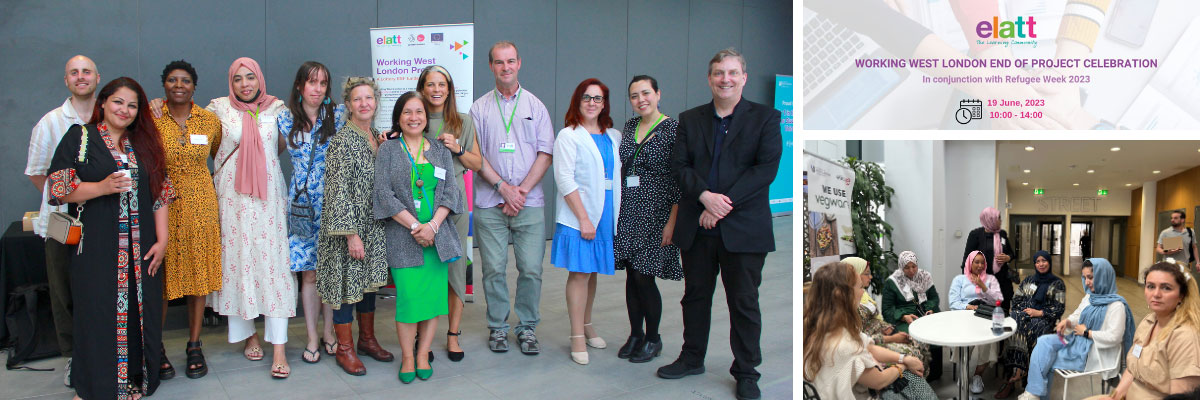
Launched in March 2017, the WWL project was a collaborative effort between ELATT, Action West London, GOSAD, and Train To Work. Funded by the Big Lottery Fund and European Social Fund, the project’s mission was to facilitate pathways for refugees to move closer to the job market. Initially planned for three years with 331 participants, it has since been extended to seven years and has impacted 793 people.
The project’s success was measured by the number of participants progressing into further education and employment. It successfully reached all its targets, demonstrating the transformative power of tailored support and guidance.
As we near the project’s completion, we recently held an end-of-project celebration event on June 19th to acknowledge the project’s achievements and the transformative impact it has had on the lives of refugees.
The WWL project catered to a diverse group of refugees, ranging from 17 to 82 years old, with varying levels of education and professional experience. Despite their differences, the project’s participants shared common barriers: language difficulties, lack of employability confidence, disorientation, and isolation.
To address these barriers comprehensively, the project provided English language classes, job search support, housing advice, and wellbeing services. The project also fostered a friendly and understanding environment, and testimonials from various participants emphasize the advisors as the most vital aspect of the project for them.
The project’s impact is best illustrated by its outcomes. Out of the 765 participants, 219 pursued further education, and 144 secured employment. Additionally, the project helped participants enhance their self-confidence, English language skills, and knowledge of local services, setting them on a path towards a brighter future.
The recent celebration event served as a platform to share the project’s achievements and the lessons learned. The event highlighted the importance of a flexible, tailored approach, extensive support from local partners, and an emphasis on self-empowerment. It also underscored the value of friendly, expert advisors and the importance of developing self-confidence. Furthermore, the event shed light on the project’s response to the COVID-19 pandemic. The project quickly adapted to remote delivery, providing digital devices and mobile Wi-Fi to those in need. This rapid response ensured that participants could continue to access the project’s services and other essential resources during the lockdown.
The event commenced with speeches by Anthony Harmer, ELATT CEO, Carol Sam, Assistant Director of Equalities and Engagement at Ealing Council, and Sue Ormiston, EU Programme Manager at The National Lottery Community Fund. Guest Speaker Ahmad Hammami, owner of Lebanese restaurant and café Sidra and arrived in the UK from Syria as a refugee in 2016, shared his journey and experience of coming to London as a refugee. In the panel discussion featuring refugees and employers, panel participants shared their experiences. Mouda Mohammed, a project participant who graduated from a university in Sudan with a degree in counselling and health psychology, Dimitrii Radishevskii, a refugee now living in London and working as a marketing and branding designer, Mohammed Khatir, another project participant who has completed a bachelor’s degree and a master’s degree in law, and Mustafa Muse, the director of Train2Work Academy and an employer who actively hires individuals with refugee status, discussed the challenges faced by refugees in finding employment.
In conclusion, the Working West London project has provided valuable insights into supporting refugees and helping them overcome barriers to employment. One of the key lessons we learned is that a “one size fits all” approach is inadequate when dealing with the diverse range of individuals. Instead, the project’s strength lies in its individualistic approach, recognizing and addressing the unique needs and challenges of each participant.
Another important lesson is that unless we address the immediate crisis or issues faced by individuals during their time on the project, our ability to make a meaningful difference in their lives will be hindered. It is essential to provide support and assistance in areas such as anxiety, debt, and housing issues, as these can significantly impact a person’s ability to focus on employment or educational progress. By covering all the bases and offering comprehensive support, we create a solid foundation from which participants can pursue their goals.
As we reflect on the success of the Working West London project, we are reminded of the potential that lies within each individual. By adopting an individualized approach, addressing immediate crises, and fostering supportive relationships, we can empower refugees to overcome barriers, unleash their potential, and make significant contributions to society. The Working West London project stands as a testament to the resilience and determination of refugees and the transformative power of tailored support and guidance.
© ELATT 2024 | East London Advanced Technology Training (ELATT) is a registered charity in England and Wales 299186, registered company 01812908